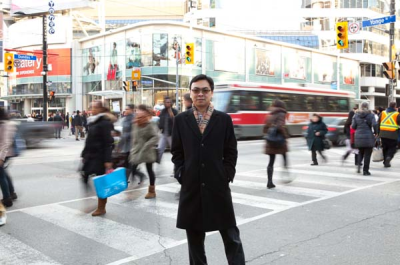Canada Research Chair Joseph Chow aims to make transportation systems work more seamlessly, sustainably and cost-effectively. Credit: Bernard Leung
Joseph Chow has an ambitious goal: to transform how urban transportation systems are managed and designed, using mobile computing, information technology and the analysis of massive data sets.
A professor in Ryerson's Department of Civil Engineering and a Tier II Canada Research Chair in Transportation Systems Engineering, Chow is focused on developing a more efficient and adaptable urban transportation system – one that reduces traffic congestion, produces less pollution, relies upon renewable energy, and ultimately, convinces people to leave their cars at home.
The importance of developing such a network isn't lost on Chow. "If you think of society as a human body, then the transportation system is the circulatory system," he says. "Therefore, a strong transportation infrastructure is critical to supporting economic growth."
Chow is studying ways to make Canada's aging transportation systems "smarter." That is done in two ways. First, designing the systems to respond to people's actual behaviour in terms of when, where and how they travel and for what reasons. Second, the systems need to be designed so that they can adapt to random fluctuations in the environment.
As Chow points out, existing transportation systems are traditionally designed without any flexibility to adapt to an uncertain environment. This situation, however, can cause many problems. One example: when multiple streetcars on the same route arrive bunched together at one stop due to delays along the line. This lack of adaptation puts a strain on the entire system and significantly reduces the level of service for commuters, says Chow.
To that end, his research is aimed at helping transportation systems to work more seamlessly, sustainably and cost-effectively. Later this summer, in fact, Chow's research will find a new home within a state-of-the-art test bed environment.
Located in Ryerson's Centre for Urban Energy and funded by the Canada Foundation for Innovation, the test bed will serve as a small-scale version of a real traffic management centre. Featuring an eight-screen video wall, multiple work stations and GPS-enabled Google tablets, the test bed will enable Chow and his team of graduate students and postdoctoral fellows to conduct experiments using a simulated urban transportation system.
While work on the test bed nears completion, Chow remains busy with several other projects involving collaborators from around the world. For instance, he has partnered with researchers at the University of California, Irvine, to analyze the infrastructure for electric-powered taxis in Seoul, South Korea. Rather than driving around aimlessly to find fares, an e-taxi driver is dispatched to an area based on customer demand, the car's remaining power and the proximity of charging stations. As a result, e-taxis produce less greenhouse gas emissions and are less expensive to run.
In another research initiative, Chow is exploring mobile platforms that would enable, for example, concert goers and sporting event attendees to use their smartphones to pay their public transit fares to the venue at a discount that is subsidized by the venue. This outsourcing of fare revenue management from the public transit agency to private third parties may increase demand to event venues, increase transit ridership (particularly during off-peak periods) and decrease the cost for travellers.
Finally, Chow has teamed up with fellow Ryerson civil engineering professor Bhagwant Persaud to predict the risk of road accidents along different routes based on current weather conditions. As society moves toward autonomous vehicles that make decisions on their own (e.g., Google's self-driving car), cars will be able to use this information in real time in order to select the safest and shortest routes.
"Once these flexible transport systems are in place, it will be much easier to make changes when they're needed," says Chow.
Provided by Ryerson University





















